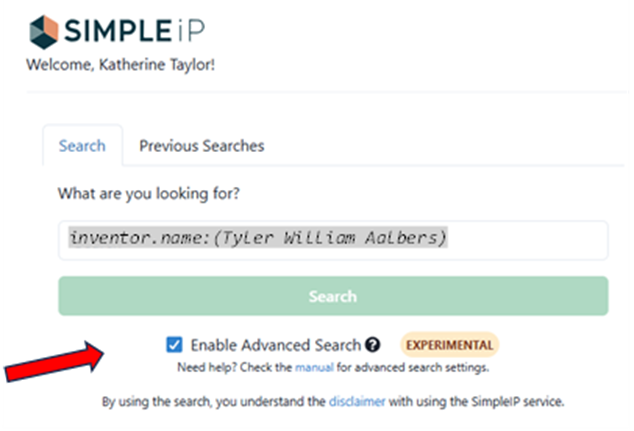SimpleIP - how can I use Advanced Search to super charge my search?
- katherinettaylor
- Feb 25
- 4 min read

Search Techniques
Search Type | Example Syntax | Description |
Boolean | solar OR wind | Use AND, OR and NOT to find different combination of words. |
Nesting/ Brackets | ((solar OR wind) AND energy) | The matter and can change significantly change the results. |
Proximity | ("battery technology"~3) | Find words in close proximity to each other eg. "Battery" and "technology" within 3 words of each other. |
Exact Match | "wireless charging device" | Exact phrase search. |
Field-Specific | abstract:(solar OR wind) | Search specific fields like title, abstract, or claims. |
Fields you can search
Main-Field Related Searches
Field to be searched | Syntax | Contents |
Full Text | (IVF sperm) | Full Text search |
Title | title:(IVF sperm) | Title of invention |
Abstract | abstract:(IVF sperm) | A brief overview of the invention, summarizing its purpose and core functionality |
Claims | claim:(IVF sperm) | The legally binding portion, defining the scope and novelty of the invention |
Patent Number | Country ID ids:(CA 2326915 A1)
Lens ID ids:(003-853-151-488-01X) | A unique identifier for the patent, useful for reference. |
Classifications (e.g., CPC, IPC) | CPC Code: Y02E10/70 (Wind Energy) class_cpc.symbol:Y02E10\/70
IPC Code: A61C1/00 (Dental machines for boring or cutting class_ipcr.symbol:A61C1\/00
IPC Code: A61 (Med or Vet Science) class_ipcr.symbol:A61*
| |
Legal status | legal_status.patent_status:(pending OR expired) | The current state of the patent, such as : expired, inactive, active, patented, discontinued, withdrawn or rejected, pending, unknown |
Jurisdiction | Jurisdiction:(US OR CA) | The country or region where the patent application is filed or the rights are enforced. |
[1] Note not all patents have a CPC classification
Entity-Related Searches (Inventor/Owner/Applicant)
Field to be searched | Syntax | Contents |
Inventor | inventor.name:(Tyler William Aalbers) | Lists the individuals who created the invention |
Owner | owner_all.name:((Newsouth Innovations) OR (New south Innovations)) | The individual or organization that currently holds the patent rights |
Applicant | applicant.name:(New South Innovations) | The person or entity that files the patent application. This can be the inventor, owner, or another party. |
Date-Related Searchs
Field to be searched | Syntax | Contents |
Priority date | earliest_priority_claim_date:(2009-05-22)
earliest_priority_claim_date:([2009-05-22 TO 2010-05-22])
| The priority date is the earliest date someone can claim rights to their invention. Think of it as the starting line for proving your idea was first. This date determines what earlier inventions (prior art) could challenge your patent. |
Application/Filing Date | application_reference.date:(2009-05-22)
application_reference.date:([2009-05-22 TO 2010-05-22])
| The date you submit your patent application to a country’s patent office. It starts the official patent process in that country. If it’s your first filing, this will also be your priority date. |
Publication date | date_published:(2009-05-22)
date_published:([2009-05-22 TO 2010-05-22])
| The publication date is when your patent application is made public by the patent office. This usually happens 18 months after the application date, allowing others to see what you’re trying to patent. |
Grant date | legal_status.grant_date:(2009-05-22)
legal_status.grant_date:([2009-05-22 TO 2010-05-22])
| The date your patent application is approved and becomes a legally enforceable patent. From this point, you can stop others from using your invention without permission. |
Example
abstract:(solar energy) AND jurisdiction:(US) AND legal_status.patent_status:(pending OR active) AND (class_ipcr.symbol:H02S*)
Appendix 1: Search Techniques - details
Booleans Using AND/OR: "Combine search terms with AND to narrow results or OR to broaden them | Example: · title:(solar OR wind) returns results containing both 'solar' or 'wind'." |
Default “AND” Any terms in brackets without a boolean between them is using AND as a default | Example: · inventor.name:(Tyler William Aalbers) is actually searching inventor.name:(Tyler AND William AND Aalbers)
|
Exact Match Search Explained An exact match search uses quotes ("") to find words in the exact order specified. For example: · "wireless charging device" This finds results with all the words in this exact order—ideal for finding specific phrases exactly as written. | Example: To search all text: · "wireless charging device"
To search specifically in the abstract: · abstract:("wireless charging device")
· This returns only patents where "wireless charging device" appears in the abstract, helping you narrow down to highly relevant matches. |
Nesting Nested Searches: Use brackets to ensure the search is done in the way you want. | Example: · abstract:((solar OR wind) AND energy) |
Proximity SearchA proximity search finds words that are close to each other but not necessarily in the exact order or right next to each other. For example:
· (("absorb hydrogen sulfide"~5) OR ("capture hydrogen sulfide"~5))
This means you want "absorb" or "capture" within 5 words of "hydrogen sulfide." It helps you find results where the terms are closely linked, but not far apart like when using AND or too exact like with quotes ("") | Example: · ("battery technology"~3) In this case, you are looking for "battery" and "technology" to be within 3 words of each other. It won’t show results where "battery" and "technology" are too far apart, like in different sentences or paragraphs, ensuring the connection between them is relevant. |
Nesting – it matters
cats OR dogs AND leashes |  |
is NOT the same as
(cats OR dogs) AND leashes |  |


Comments